Oh, anarchism, what a strange creature you are. Once a major political force all over the world (anarchists outnumbered communists for quite some time in pre-revolutionary China, for example), anarchism is now one of the most misunderstood political ideologies around.
Anarchists push for a society without institutions (the state, capitalism, patriarchy, etc.) that create disparities of power between various types of people. Anarchists are not against organization, but against authority. It’s been a political identity since the French revolutionary Pierre Joseph Proudhon self-identified as an anarchist in the mid-19th century, but the basic tenets of anarchism have been espoused or followed all over the world going back more or less forever.
Anarchists have been instrumental in any number of social movements and revolutions. Perhaps most famously, the eight-hour workday was won in wake of the death of five anarchists in Chicago, who were killed by the state simply for being anarchists.
Anarchism probably reached its high water point in the 1930s during the Spanish Civil War, when huge chunks of Spain were run collectively, without state authority. It’s continued on ever since, and anarchists continue to be involved in activism and revolutionary struggle everywhere.
I’m not much for reading political theory, though. I get almost all my ideas through conversation and through fiction. The world needs new ideas, now more than ever. Speculative fiction is uniquely suited for the exploration of new ideas. Fortunately, there’re plenty of amazing novels that explore anarchist society, philosophy, or struggle.
Here are five.
The Dispossessed by Ursula K. Le Guin
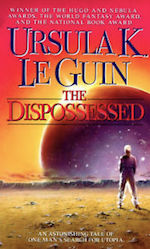 It would take an anarchist—or, I suppose, anyone intensely critical of power structures and dogmatic solutions to problems—to turn the utopian genre on its head. With The Dispossessed, Le Guin did just that. The anarchist moon of Anarres orbits the authoritarian planet of Urras. Anarres is run collectively, without government or capitalism. But our lunar protagonist, fed up with the stifling systems of social control that interfere with his scientific research, heads to Urras to learn about what worlds with government are like. I love this book for a lot of reasons—Le Guin is a grandmaster for a reason—but I’m particularly drawn to how well she contrasts the imperfection of the anti-authoritarian moon and the authoritarian planet. To be honest, I don’t want to live on Anarres (I’d rather not be named by a computer!), but I don’t know that there’s a more masterful exploration of anarchism that’s ever been written.
It would take an anarchist—or, I suppose, anyone intensely critical of power structures and dogmatic solutions to problems—to turn the utopian genre on its head. With The Dispossessed, Le Guin did just that. The anarchist moon of Anarres orbits the authoritarian planet of Urras. Anarres is run collectively, without government or capitalism. But our lunar protagonist, fed up with the stifling systems of social control that interfere with his scientific research, heads to Urras to learn about what worlds with government are like. I love this book for a lot of reasons—Le Guin is a grandmaster for a reason—but I’m particularly drawn to how well she contrasts the imperfection of the anti-authoritarian moon and the authoritarian planet. To be honest, I don’t want to live on Anarres (I’d rather not be named by a computer!), but I don’t know that there’s a more masterful exploration of anarchism that’s ever been written.
The Fifth Sacred Thing by Starhawk
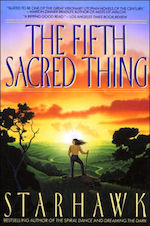 Starhawk is better known for her nonfiction than her fiction. She writes about activism, magic, and understanding systems of power. I admit, I haven’t read much of her nonfiction. But when I was a young activist fighting against the US invasion of Iraq, I read her utopian novel The Fifth Sacred Thing and I saw a vision of a society I wanted—almost desperately—to live in. In post-apocalyptic San Francisco, a group of women get together and tear up the streets to plant food. The city becomes a commune of sorts, with an open assembly that makes its decisions, leaving individuals free to contribute to society how they prefer. Most of the story focuses on the role of violence and pacifism in defense of an egalitarian society, but for me the single strongest part of this book is the astounding beauty of human possibility it suggests.
Starhawk is better known for her nonfiction than her fiction. She writes about activism, magic, and understanding systems of power. I admit, I haven’t read much of her nonfiction. But when I was a young activist fighting against the US invasion of Iraq, I read her utopian novel The Fifth Sacred Thing and I saw a vision of a society I wanted—almost desperately—to live in. In post-apocalyptic San Francisco, a group of women get together and tear up the streets to plant food. The city becomes a commune of sorts, with an open assembly that makes its decisions, leaving individuals free to contribute to society how they prefer. Most of the story focuses on the role of violence and pacifism in defense of an egalitarian society, but for me the single strongest part of this book is the astounding beauty of human possibility it suggests.
Walkaway by Cory Doctorow
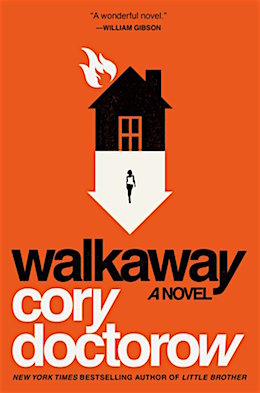 I just finished this book a week or two ago, and it’s sitting in the forefront of my brain. I don’t know that there’s a single book I’ve read that is more directly relevant to the issues facing the world today. In Walkaway, an international dropout culture of squatters, hackers, scientists, artists, and the like is living “the first days of a better nation.” I don’t think there’s ever been a more convincing piece of fiction to explore the intricacies of how people can be motivated to contribute to society without money or mandatory labor. Walkaway is set in the latter half of the 21st century, when technologies like 3D printing have removed the ghost of scarcity from the economy, but its lessons are directly relevant now as well. Doctorow brings anti-authoritarian values not just to the content but to the form of the book: it follows characters close to the center of some of the action, but it doesn’t pretend that one group of people will be the focal point of every aspect of a revolution.
I just finished this book a week or two ago, and it’s sitting in the forefront of my brain. I don’t know that there’s a single book I’ve read that is more directly relevant to the issues facing the world today. In Walkaway, an international dropout culture of squatters, hackers, scientists, artists, and the like is living “the first days of a better nation.” I don’t think there’s ever been a more convincing piece of fiction to explore the intricacies of how people can be motivated to contribute to society without money or mandatory labor. Walkaway is set in the latter half of the 21st century, when technologies like 3D printing have removed the ghost of scarcity from the economy, but its lessons are directly relevant now as well. Doctorow brings anti-authoritarian values not just to the content but to the form of the book: it follows characters close to the center of some of the action, but it doesn’t pretend that one group of people will be the focal point of every aspect of a revolution.
The Watch by Dennis Danvers
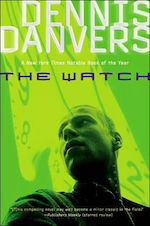 It’s possible that The Watch is my favorite time travel story I’ve ever read because it’s about one of my favorite historical characters—the Russian prince-turned-revolutionary-and-scientist Peter Kropotkin—transported to a time and place I’m more familiar with: the activist scene of Richmond, Virginia, 1999. It’s also possible that it’s my favorite time travel story because it’s so wonderfully low-key and Danvers is a master of having his characters from the past dropped into the present actually act realistically. Either way, it’s my favorite time travel story.
It’s possible that The Watch is my favorite time travel story I’ve ever read because it’s about one of my favorite historical characters—the Russian prince-turned-revolutionary-and-scientist Peter Kropotkin—transported to a time and place I’m more familiar with: the activist scene of Richmond, Virginia, 1999. It’s also possible that it’s my favorite time travel story because it’s so wonderfully low-key and Danvers is a master of having his characters from the past dropped into the present actually act realistically. Either way, it’s my favorite time travel story.
The Steel Tsar by Michael Moorcock
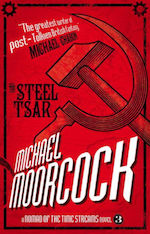 Not all anarchist fiction is so serious. Some of it is just downright fun. No one does classic pulp adventure with an anti-authoritarian edge like Michael Moorcock. The Steel Tsar is the last in Moorcock’s Nomad In the Time Stream trilogy, which for the record is the earliest completely-and-utterly-steampunk work I’ve ever been able to find. I could kind of ramble on about Moorcock and all of the unacknowledged influences he’s had on this world (tabletop RPGs owe Moorcock at least as much credit as they owe Tolkien, plus he invented the chaos star, plus… steampunk…), but instead I’ll just tell you that The Steel Tsar has airships, nuclear weapons, a robotic Stalin, and the Ukranian anarchist Nestor Makhno. Which is to say, in the hands of a practiced master like Moorcock, you really can’t go wrong.
Not all anarchist fiction is so serious. Some of it is just downright fun. No one does classic pulp adventure with an anti-authoritarian edge like Michael Moorcock. The Steel Tsar is the last in Moorcock’s Nomad In the Time Stream trilogy, which for the record is the earliest completely-and-utterly-steampunk work I’ve ever been able to find. I could kind of ramble on about Moorcock and all of the unacknowledged influences he’s had on this world (tabletop RPGs owe Moorcock at least as much credit as they owe Tolkien, plus he invented the chaos star, plus… steampunk…), but instead I’ll just tell you that The Steel Tsar has airships, nuclear weapons, a robotic Stalin, and the Ukranian anarchist Nestor Makhno. Which is to say, in the hands of a practiced master like Moorcock, you really can’t go wrong.
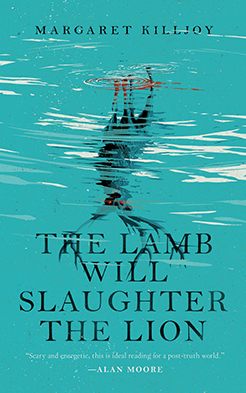 Margaret Killjoy is a transfeminine author, born and raised in Maryland, who has spent her adult life traveling with no fixed home. A 2015 graduate of Clarion West, Margaret’s short fiction has been published by Tor.com, Strange Horizons, Vice’s Terraform, and Fireside Fiction amongst others. She founded SteamPunk Magazine in 2006, and her nonfiction books have been published by anarchist publisher AK Press. Margaret’s wrote A Country of Ghosts, a utopian novel published by Combustion Books in 2014. She is also the author of the Danielle Cain series, starting with The Lamb Will Slaughter the Lion, from Tor.com Publishing.
Margaret Killjoy is a transfeminine author, born and raised in Maryland, who has spent her adult life traveling with no fixed home. A 2015 graduate of Clarion West, Margaret’s short fiction has been published by Tor.com, Strange Horizons, Vice’s Terraform, and Fireside Fiction amongst others. She founded SteamPunk Magazine in 2006, and her nonfiction books have been published by anarchist publisher AK Press. Margaret’s wrote A Country of Ghosts, a utopian novel published by Combustion Books in 2014. She is also the author of the Danielle Cain series, starting with The Lamb Will Slaughter the Lion, from Tor.com Publishing.










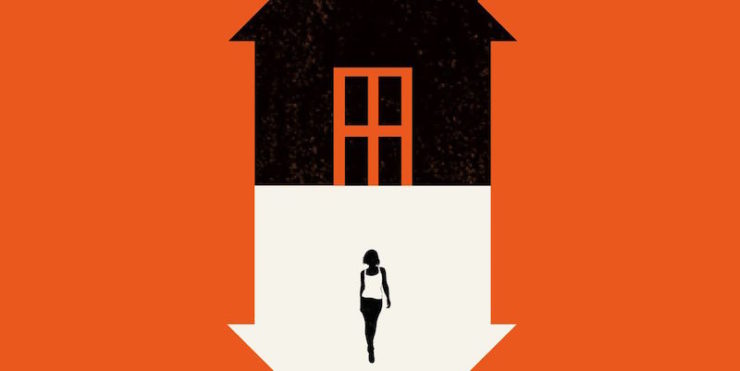
Ah Anarchism. The finest way to disarm a population and make it almost easy for an authoritarian to take power – exactly what they gained for the Spanish people in the aftermath of their civil war. Only in fiction do anarchists actually succeed at anything.
Utopia? A perfect word for this kind of fantasy: οὐ (“not”) and τόπος (“place”) meaning”no-place” which is what it must remain for people to have an chance at long term peace, prosperity and freedom using the mechanisms of unions, co-operative ownership and democratic polity.
There’s a couple here I’ve never read and I’m super excited to add them to my list. I would like to add anything by Ken Mcleod, but especially his Fall Revolution series. It explores not just anarchism but other forms of isms and how they all interact with each other and the pragmatic choices people must make trying to stay true to their convictions.
What wlewisiii says is that anarchism is the one to blame when an authoritarian government rises. So, for him/her, lest a new fascist power emerges, let’s become fascists ourselves.
Eric Frank Russell’s “…And Then There Were None” (part of The Great Explosion).
wlewisiii, I don’t know many anarchists that plan to disarm. It’s not a particularly pacifist movement.
I wonder if its a good idea to get your political thoughts so much from works of fiction. They are all made up, after all.
FWIW – The most interesting political idea I have come across recently was Douglass C. North’s idea of Limited and Open Access Orders. A Limited Access Order is one where the governing coalition stays in power by allocating rewards and privileges on the powerful, to get them to stay loyal to the coalition. (Think of Game of Thrones).
An Open Access Order is one which is kept stable by making it easy for people to form coalitions to protect their economic and political aims. From that point of view, it is relatively easy in America to form a new corporation, charity or lobby group, but pretty much impossible to challenge the Republican-Democratic duopoly on elected office. Britain is much the same. This might explain a lot about how nasty their politics have become.
@nL: Anarcho-pacifism is a real thing
Le Guin’s The Dispossessed is great. But it is neither her only nor even her most anarchist utopian fiction. I recommend her 1985 novel/carrying bag/future anthropologist field notes book Always Coming Home. The future Napa Valley people depicted in it live without hierarchies, although not without problems. Internal difficulties are dealt with in a better way than the mean fights between anarchosyndicalists-turned-bureaucrats on Anarres. External problems (like being unarmed stone age people when a fascist neighbor with tanks and airplanes wants to attack) are dealt with similarly as in Starhawk’s book: Not in the rugged wild west manner so many Americans seem to be so fond of, but with nonviolent actions. Of course, some of the utopians prefer to take up arms to make war with the enemy. And that’s where they end up: in war, and with the enemy.
This is not to say that anarchists are those that disarm the population. Historically, it’s the other way round. Wherever anarchists have tried to revolutionize the land they were living on (e.g. Ukraine, Bavaria, Spain), they disarmed the ruling classes by an armed uprising of the populace. This did not really work for long. Armed battle can be lost (by anarchists as well as by archists). You want to read science fiction where armed anarchists try to fight for their freedom? Why not start with Margaret Killjoy’s own A Country of Ghosts? Or Kim Stanley Robinson’s Mars Trilogy? An anarchist society that does not fear to wage brutal wars against its enemies is depicted in Iain M. Banks’s Culture series. But it is not the fact that they fight governments and their armies that makes these (fictional) fighters anarchist. Governments and their armies fight (other) governments and their armies as well. It is rather what they struggle for, and how they relate to one another, what makes them anarchist.
It is great to learn about new anarchist novels I haven’t heard of yet. Thanks for the list!
Although I am unfamiliar with the forementioned authors other than Le Guinn and Moorcock, I am surprised that the author did not mention or include Heinlein’s The Moon is a Harsh Mistress where Anarchism is seen from the perspective of an isolated, lawless, imprisoned society.
The idea of describing a subversive rebellion to authority while the novel’s characters are living within a functional anarchistic society brings both outlooks on anarchism together.
Heinlein finally has his character Dr. De la Paz offer a final speech on the options of self government without letting us know the outcome. I have always found this work fascinating, because as a work of fiction it allows us to see these ideas lived out by characters we can relate to.
Robinson’s Mars Trilogy is a important addition to any anarchist book list. Also, I highly recommend Killjoy’s Country of Ghosts, its an excellent read!
Anarchaos is more for the Donald Westlake completist than for the student of political thought. After deservedly poor sales the original edition achieved some high prices on the used market for rarity and interest in the author. On its own merits it would have sunk without a trace.
A useful reminder that anarchy is power spread thin neither a legitimate concentration in a sovereign power nor scattered to war lords or tribes.